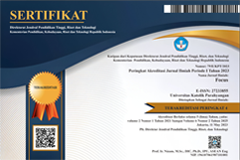The Impact of Using Mining Technology on the Environment in the Manggarai Mine Circle Community From the Ethical Perspective of Hans Jonas
DOI:
https://doi.org/10.26593/focus.v3i2.5799Keywords:
Technology Ethics, Mining Problem, Ecological Issue, Technology ImpactAbstract
This paper focuses on the issue of the impact of the use of mining technology on the environment of the Manggarai mining circle community from the perspective of Hans Jonas responsibility ethics. Technological advances increasingly developing have a tangible impact on the entire order of human life. In addition to being very helpful to humans in everyday life, it turns out that the presence of technology negatively impacts humans, including the environment. The environment is often used as an object that provides satisfaction and benefits for humans, even so, many problems arise due to the transition of functions to nature to generate profits. The environment becomes threatened because it is polluted and damaged. The authors raised this issue using the literature method with the sources used in the form of literature from various books and journals. According to Hans Jonas, the findings of this paper are that the environment is the place and future of all living things, especially humans. Therefore, the living environment needs to be appropriately maintained, cared for, and preserved for the integrity of the existing creation and living in it.
References
Adamopoulou, E., & Moussiades, L. (2020). Chatbots: History, technology, and applications. Machine Learning with Applications, 2, 100006.
Akçayir Dündar Akçayir, G., M, H. (2016). What makes you a digital native? Is it enough to be born after 1980? Computers in Human Behavior, 60(8), 435–440. https://doi.org/https://doi.org/10.1016/j.chb.2016.02.089
Armada Riyanto, A. (2013). Menjadi—Mencintai: Berfilsafat Teologi Sehari-hari. Yogyakarta: Kanisius.
Arrieta, A. B., Díaz-Rodríguez, N., Del Ser, J., Bennetot, A., Tabik, S., Barbado, A., García, S., Gil-López, S., Molina, D., & Benjamins, R. (2020). Explainable Artificial Intelligence (XAI): Concepts, taxonomies, opportunities and challenges toward responsible AI. Information Fusion, 58, 82–115.
Baeva, L. V. (2016). Virtual Communication. International Journal of Technoethics, 7(1), 51–61. https://doi.org/10.4018/IJT.2016010104
Bertrand, G. (2019). The roots of Hans Jonas’ Ethics of the future, and precaution. Journal of Applied Ethics and Philosophy, 10, 1–7.
Bombiak, E., & Marciniuk-Kluska, A. (2018). Green human resource management as a tool for the sustainable development of enterprises: Polish young company experience. Sustainability, 10(6), 1739.
Chan, K. M. A., Gould, R. K., & Pascual, U. (2018). Editorial overview: relational values: what are they, and what’s the fuss about? In Current Opinion in Environmental Sustainability (Vol. 35, pp. A1–A7). Elsevier.
Coyne, L. (2020). Hans Jonas: Life, technology and the horizons of responsibility. Bloomsbury Publishing.
Faggian, A., Partridge, M., & Malecki, E. J. (2017). Creating an environment for economic growth: creativity, entrepreneurship or human capital? International Journal of Urban and Regional Research, 41(6), 997–1009.
Hakim, D. A. (2015). Politik Hukum Lingkungan Hidup Di Indonesia Berdasarkan Undang-Undang Nomor 32 Tahun 2009 Tentang Perlindungan dan Pengelolaan Lingkungan Hidup. Fiat Justisia: Jurnal Ilmu Hukum, 9(2).
Handadhari, T., Krisnadi, A. D., & Toruan, R. L. (2009). Kepedulian yang terganjal: menguak belantara permasalahan kehutanan Indonesia. Elex Media Komputindo.
Jonas, H. (1985). The imperative of responsibility: In search of an ethics for the technological age. University of Chicago press.
JPIC OFM. (2008).
Juul, A., Wilding, R., & Baldassar, L. (2019). The Best Day of the Week: New Technology Enhancing Quality of Life in a Care Home. International Journal of Environmental Research and Public Health, 16(6), 1000.
Kehutanan, P. M. dan D. (2009). PT Sumber Jaya Asia.
Kusuma, M., & Rahman, M. T. (2018). The role of social institutions on online business development in Cimahi, West Java, Indonesia. Jurnal Socio-Politica, 8(2), 165–173.
Listiyani, N., Hayat, M. A., & Mandala, S. (2018). Penormaan pengawasan izin lingkungan dalam pencegahan pencemaran dan kerusakan lingkungan hidup dalam eksploitasi sumber daya alam. Jurnal Media Hukum, 25(2), 217–227.
Mazur, K., & Tomashuk, I. (2020). Governance and Regulation as an Indispensable Condition for Developing the Potential of Rural Areas. Baltic Journal of Economic Studies, 5(5), 67. https://doi.org/10.30525/2256-0742/2019-5-5-67-78
Mousa, S. K., & Othman, M. (2020). The impact of green human resource management practices on sustainable performance in healthcare organisations: A conceptual framework. Journal of Cleaner Production, 243, 118595.
Owston, R. (2018). Empowering learners through blended learning. International Journal on E-Learning, 17(1), 65–83.
Patrício, J. T. D. (2018). Lisbon’s Web Summit: an event and tourism impact study. http://hdl.handle.net/10400.14/25378
Rahman, M. T., & Mufti, M. (2021). Massification of youth religious studies to prevent juvenile delinquency in Bandung. HTS Teologiese Studies/Theological Studies, 77(4), 9.
Rane, H. (2019). “Cogent Religious Instruction”: A Response to the Phenomenon of Radical Islamist Terrorism in Australia. Religions, 10(4), 246.
Regus, M. (2015). Tambang dan perlawanan rakyat: studi kasus tambang di Manggarai, Ntt. Masyarakat: Jurnal Sosiologi, 1–25.
Rosana, M. (2018). Kebijakan pembangunan berkelanjutan yang berwawasan lingkungan di Indonesia. Kelola: Jurnal Sosial Politik, 1(1), 152.
Shcheblyakov, E. S., Ivanova, N. G., Melnikova, T. V, & Farafontova, E. L. (2019). The main environmental problems of mankind and possible solutions. IOP Conference Series: Earth and Environmental Science, 315(2), 22083.

Downloads
Published
Issue
Section
License
Copyright (c) 2022 Hironimus Jesanto Tamat, Herman Flani Odang

This work is licensed under a Creative Commons Attribution-ShareAlike 4.0 International License.



















